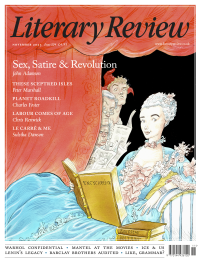Donald Rayfield
Ten Years That Shook the World
Blood on the Snow: The Russian Revolution 1914–1924
By Robert Service
Picador 496pp £30
Blood on the Snow crowns Robert Service’s four decades of work on the Russian Revolution and its perpetrators. It differs in focus from his studies of the Bolshevik Party, Tsar Nicholas II, Lenin, Trotsky and Stalin. Here we listen to the unfortunate citizens of Petrograd, Moscow and small towns, such as Totma in northern Russia, who found paper, ink and time to record deprivation, fear and despair as their world collapsed and no new one coalesced. Service also provides a coherent account of the complex civil wars all over Russia that eventually determined the Bolshevik victory. The familiar historical framework remains: a struggle between revolutionaries and the old regime, with moderates caught impotently between them. The book does not underplay the intrigues and strokes of fortune that enabled Lenin and Trotsky to traumatise a hundred million human beings.
One original aspect of Blood on the Snow is the dating. Convention dictates that the Russian Revolution began in February 1917 with the abdication of the tsar and ended in December 1922 with the formation of the Union of Soviet Socialist Republics. One of Service’s earlier books on the subject, The Russian Revolution, 1900–1927, located the roots of revolution in the destabilisation of Russia that resulted from conflict between government ministers, the tsar and the public, and took as its endpoint Stalin’s extermination or disablement of actual or potential opponents. Here he begins with the year 1914, which is a more plausible starting point: the die was cast after Russia took the decision to honour its pledge to Serbia, its protégé, by declaring war on Austro-Hungary; far-sighted commentators (including Grigori Rasputin) foresaw that world war, once joined by Germany, would doom Russia. The endpoint of this book, 1924, saw the death of Lenin and a struggle to succeed him, with Stalin tricking or forcing other leading Bolsheviks into surrendering authority. ‘From Autocracy to Autocracy’ might be an alternative subtitle for Service’s book.
To observers such as my grandfather, who in 1915 invested the family fortune in Russian railways, Russia had made great progress in catching up with the economies and political freedoms of western Europe since Tsar Alexander II’s reforms. A gradual liberal revolution could be seen in the provision of

Sign Up to our newsletter
Receive free articles, highlights from the archive, news, details of prizes, and much more.@Lit_Review
Follow Literary Review on Twitter
Twitter Feed
It wasn’t until 1825 that Pepys’s diary became available for the first time. How it was eventually decrypted and published is a story of subterfuge and duplicity.
Kate Loveman tells the tale.
Kate Loveman - Publishing Pepys
Kate Loveman: Publishing Pepys
literaryreview.co.uk
Arthur Christopher Benson was a pillar of the Edwardian establishment. He was supremely well connected. As his newly published diaries reveal, he was also riotously indiscreet.
Piers Brendon compares Benson’s journals to others from the 20th century.
Piers Brendon - Land of Dopes & Tories
Piers Brendon: Land of Dopes & Tories - The Benson Diaries: Selections from the Diary of Arthur Christopher Benson by Eamon Duffy & Ronald Hyam (edd)
literaryreview.co.uk
Of the siblings Gwen and Augustus John, it is Augustus who has commanded most attention from collectors and connoisseurs.
Was he really the finer artist, asks Tanya Harrod, or is it time Gwen emerged from her brother’s shadow?
Tanya Harrod - Cut from the Same Canvas
Tanya Harrod: Cut from the Same Canvas - Artists, Siblings, Visionaries: The Lives and Loves of Gwen and Augustus John by Judith Mackrell
literaryreview.co.uk